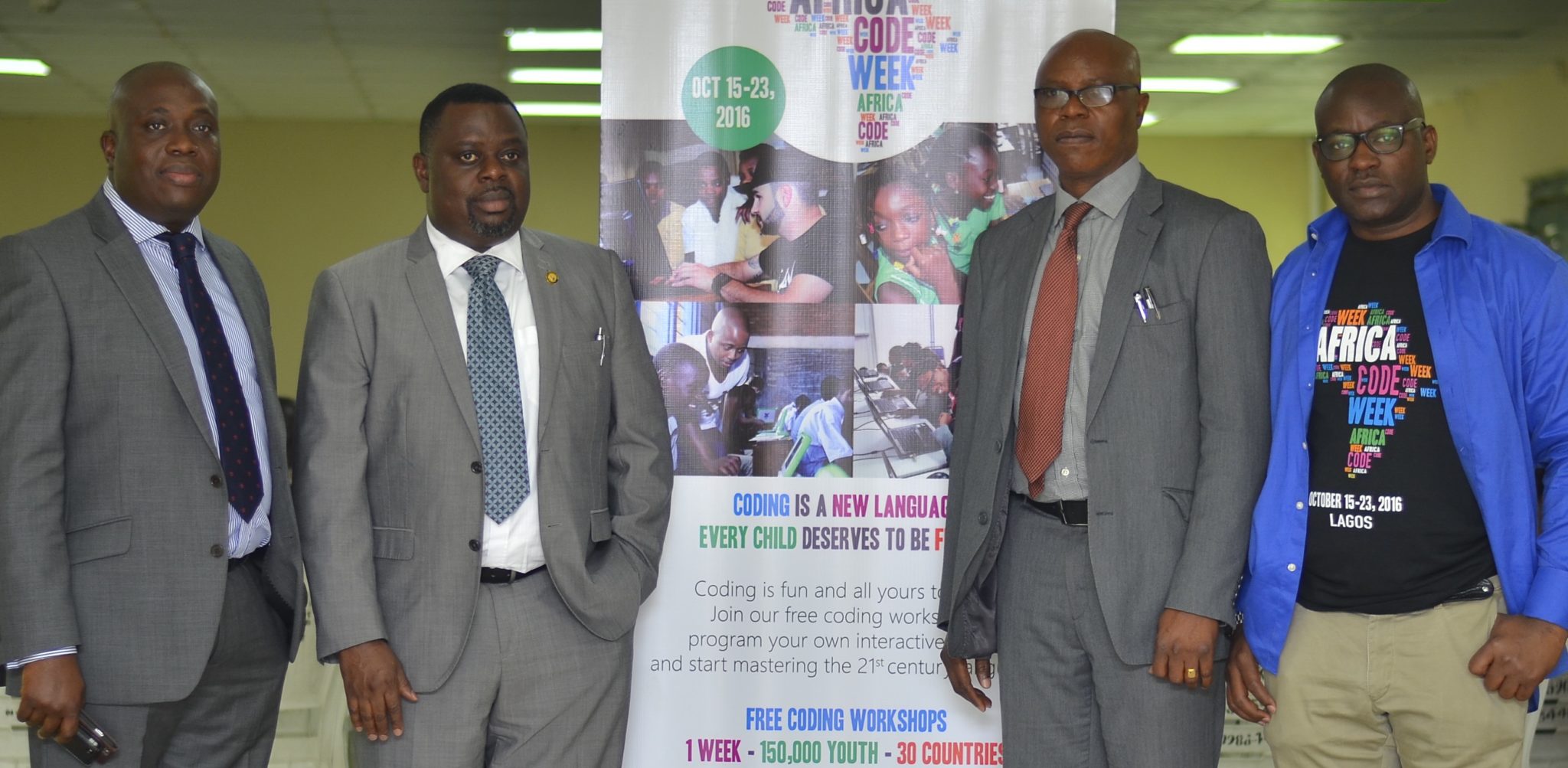- Lagos Buys Into SAP Digital Revolution- Oduniyi
- Coding Skills Will Soon Become Like Math and English- Familus
- ACW Simplifies Face of Coding For Young Generation- Ajayi

(L-r): Head, Business Operations, West Africa at SAP Olu Familusi; Honourable Commissioner, Lagos State Ministry of Science and Technology, Mr. Femi Odubiyi; Permanent Secretary, Lagos State Ministry of Science and Technology and Nigeria’s Coordinator of Africa Code Week, Mr. Olajide Ademola Ajayi, at the commencement of Africa Code Week 2016 held at Lagos State Digital Village, Alausa on Tuesday, September 27, 2016. Spearheaded by SAP as part of its social investments to drive sustainable growth in Africa, Africa Code Week (ACW) has commenced in Nigeria with a call on the Government to encourage coding skills in Schools.
Already, the Lagos State Government has identified ‘Africa Code Week’ (ACW), a continent-wide initiative to spark the interest of African children, teenagers and young adults in software coding, as a digitally revolutionary approach to get the youths acquainted with the required skills set to face future workplace/ technological developments.
ACW shares a story of hundreds of schools, teachers, ministers, community centers, code clubs, NGOs, businesses and non-profits getting together to give birth to the largest digital literacy initiative ever organized on the African continent.
Speaking at the commencement of @AfricaCodeWeek 2016 in Lagos, Honourable Commissioner, Lagos State Ministry of Science and Technology, Mr. Femi Odubiyi, said that with SAP’s long-term goal through ACW, to empower over 200,000 teachers and positively impacting the lives of five million children and youth within the next 10 years, the programme is appropriate and critical to the State’s plan to empower the youths.
Mr. Odubiyi said, “One of the things that drive this government is the action to grow and empower our youths. One of the areas through which we can articulate that, is through the information and communication technologies (ICTs). We are in the era of digital revolution. This government wants to ensure that we do not miss out of that revolution; we want to empower our future leaders who are the youths of today.
“We want to help them to develop their creativity and be able to think out of the box. Today they are using coding tools; tomorrow they will be empowered to do more than that, by developing programs on e-health, security apparatuses and so forth. What is been imbedded in them today are skills required for the future.”
In reflecting on the ICT/coding curriculum for Schools in the State, the Commissioner said that ICT is consistently changing the environment; hence the State is moving with the trends. “This is the principal reason the State adopts programmes like Africa Code Week. We want to enhance the capacity of our teachers to be relevant”.
To the participating teachers the Commissioner had the following message: “The teachers are the first beneficiaries; thus, they are been empowered. What they are doing now is to get the required skills to develop the future cognitive thinkers. They are trail blazers who are going to lead the digital revolution in Lagos State”.
Also speaking at the event was Olu Familusi, Head, Business Operations, SAP West Africa, who said that with businesses increasingly digital and globally connected, coding is the new language for individual and economic growth.
With the distinction of being the fastest growing digital consumer market on the planet, Africa continues to quickly embrace new technology and digital trends as estimated. For example, there will be 360 million Smart Phone users in Africa by 2025, there are 100 million African people active on Facebook every month, 40% of African businesses are in the planning stages of a big data project and 31% of all Africans live within 25kms of fibre node.
To this end, Familusi said, “We have to emphasis ‘Digitization, Youth and the Skills Gap in Africa. Today’s millennial generations are truly digital natives. Over the next 25 years, it is estimated that Africa’s working-age population will double to one billion, exceeding that of China and India, with 122 million people to be added to the workforce by 2020. It is also estimated that less than one percent of African children currently leave school with basic coding skills.
“Moving forward, coding skills will almost become like the math and English. That is what we see and we are trying to address same. At this point in time in Africa, less than one percent (less 1%) of school leavers has this skill. So we have this metric around people who are coming on board, huge workforce, but how prepared are they to face the future.”
Africa Code Week (ACW) is aligned with SAP’s skills development program launched in 2013. Investing in IT skills for young people is critical to SAP’s commitment to build sustainable growth in Africa. SAP has launched successful IT skills development programs around the world touching the lives of children and youth at various phases of education from primary to graduate. ACW builds on the success of government driven Code Week across the EU, which SAP strongly supports as a private sector partner.
Speaking on the significance of ACW, Nigeria’s Coordinator of Africa Code Week, Mr. Olajide Ademola Ajayi, emphasized that by sparking interest in creative computing through hands-on, playful learning,
Africa Code Week simplifies the face of coding for the young generation.
“When it comes to accessing higher skills development, training thousands of teachers, parents and educators across 30 African countries and providing access to them online with courses beyond the actual event time allows to multiply efforts and impact.”
Even the results recorded in 2015 speak for themselves. The 2015 edition went viral with over 89,000 youth introduced to coding across 17 countries in 10 days only (over 4 times the initial goal of training 20,000).
What makes ACW unique is that, by sparking interest in creative computing through hands-on, playful learning, Africa Code Week simplifies the face of coding for the young generation.
ACW is aimed at spreading digital literacy across the continent and start shaping tomorrow’s skilled workforce for sustainable growth in Africa.
SAP already invests in Skills for Africa, which provides additional business and IT skills to recent university graduates.
ACW reinforces that commitment to graduates while extending it to primary and secondary students, creating a full lifecycle of skills support for young people in Africa.








